On Day 3 of the LoveSingapore Pastors Summit, Senior Pastor Daniel Khong (FCBC) led a panel discussion titled “The Church Younger & Stronger” which sought to provide an overview of how youth ministries in the land are doing.
He was joined by:
- PS Liaw Zheng Kai (HOPE Singapore)
- PS Melissa Quah (Faith Community Baptist Church)
- PS Joel Tan (Victory Family Centre)
Polling hundreds of youth pastors and workers in the audience via Mentimeter, the survey results proved to be most eye-opening on the transitions and experiences youth congregations have faced through COVID-19 — and how things have been going in a post-pandemic world.
Below, we’ve reproduced some of their reflections and findings.
Numbers
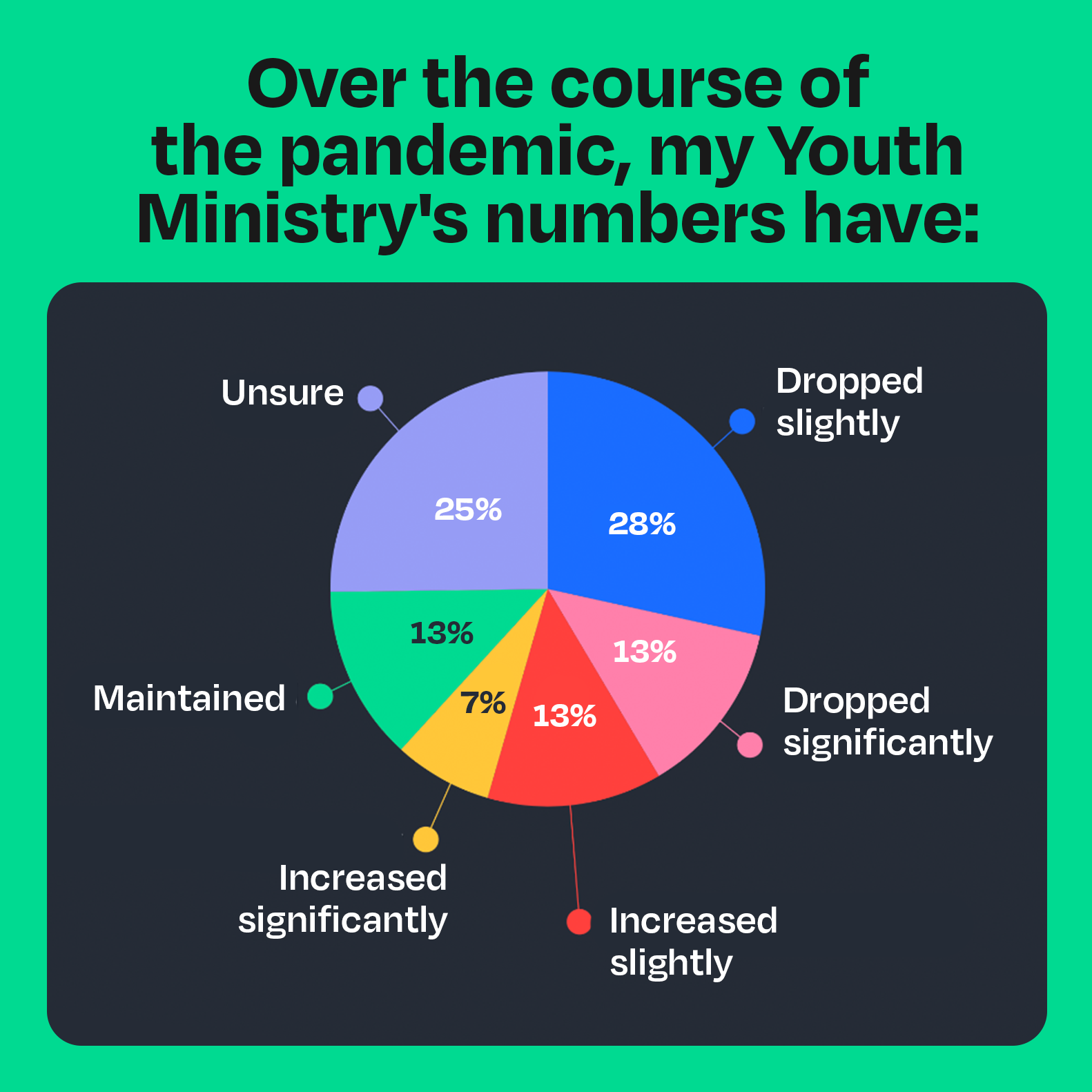
This question sought to understand how COVID-19 impacted the population of youth congregations after big gatherings could not be had.
PS ZHENG KAI: Between 13 to 18 are the formative years of a young person’s spiritual journey, so not being able to come to church to worship and fellowship for an extended period of time was not very helpful.
When COVID-19 hit, many who were new believers started falling away. Those who remained tended to be long-term believers; they are convinced of the gospel, they set their mind to follow Jesus.
PASTOR JOEL: Going into COVID-19, we had like 600 to 700 youths. Then it actually grew during the pandemic!
Small groups were really the main thing that kept things going. We still managed to do a youth camp and conference with hybrid arrangements; we still saw people getting baptised in the Holy Spirit over livestream, miracles happening.
It was small groups or nothing. Without the small groups, I don’t think we would even have been left with 500 at this point. Small groups were really, really key to everything that we did.
The success of a ministry is not about attendance but the depth of relationship and helping our our cell community become strong and vibrant.
PASTOR MELISSA: One revelation that our team had was seeing that it isn’t just about big programmes. In the past, we often saw success as doing a big major harvest programme: 1000 visitors, over a hundred hands raised.
Through COVID-19, we realised that it’s about going back to the essentials. The success of a ministry is not about attendance but the depth of relationship and helping our our cell community become strong and vibrant.
Stability and new approaches
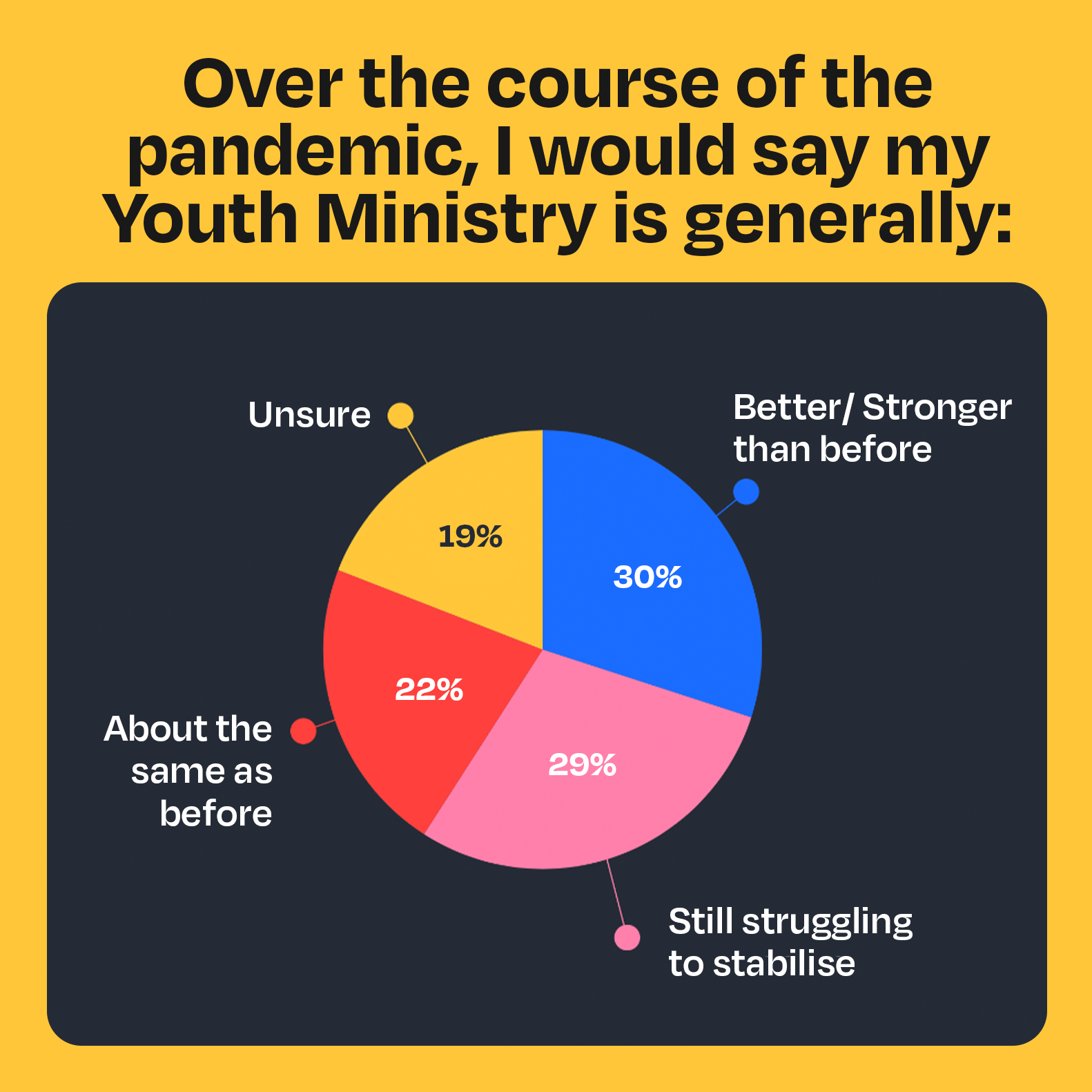
The numbers above painted a broad picture of the health and current growth stage of youth congregations across the island. Looking at these figures, Senior Pastor Daniel Khong posed the question: “How has Covid changed your approach to youth ministry?”
PASTOR ZHENG KAI: Physical meetings are still the primary way that we are trying to lead in, so we are encouraging people to come to life group and service in person as much as possible.
But we also view the online space as a complement. There are some meetings that we choose to bring online, so that certain physical meetings don’t happen so frequently.
We also started our TikTok ministry last year. Engaging people over TikTok resulted in new visitors coming to our service.
The way forward that I see for youth ministry involves a hybrid model. There’s a leaning on the physical aspect, like around 65-75% — and then there are online tools that we use to complement our discipleship or outreach focuses.
PASTOR MELISSA: Meeting physically is important, but we do not want to discard all that we have learned through COVID about using the online tools available.
These online tools will be very effective for people who really have difficulty being fully committed because of persecution and various reasons.
Evangelism
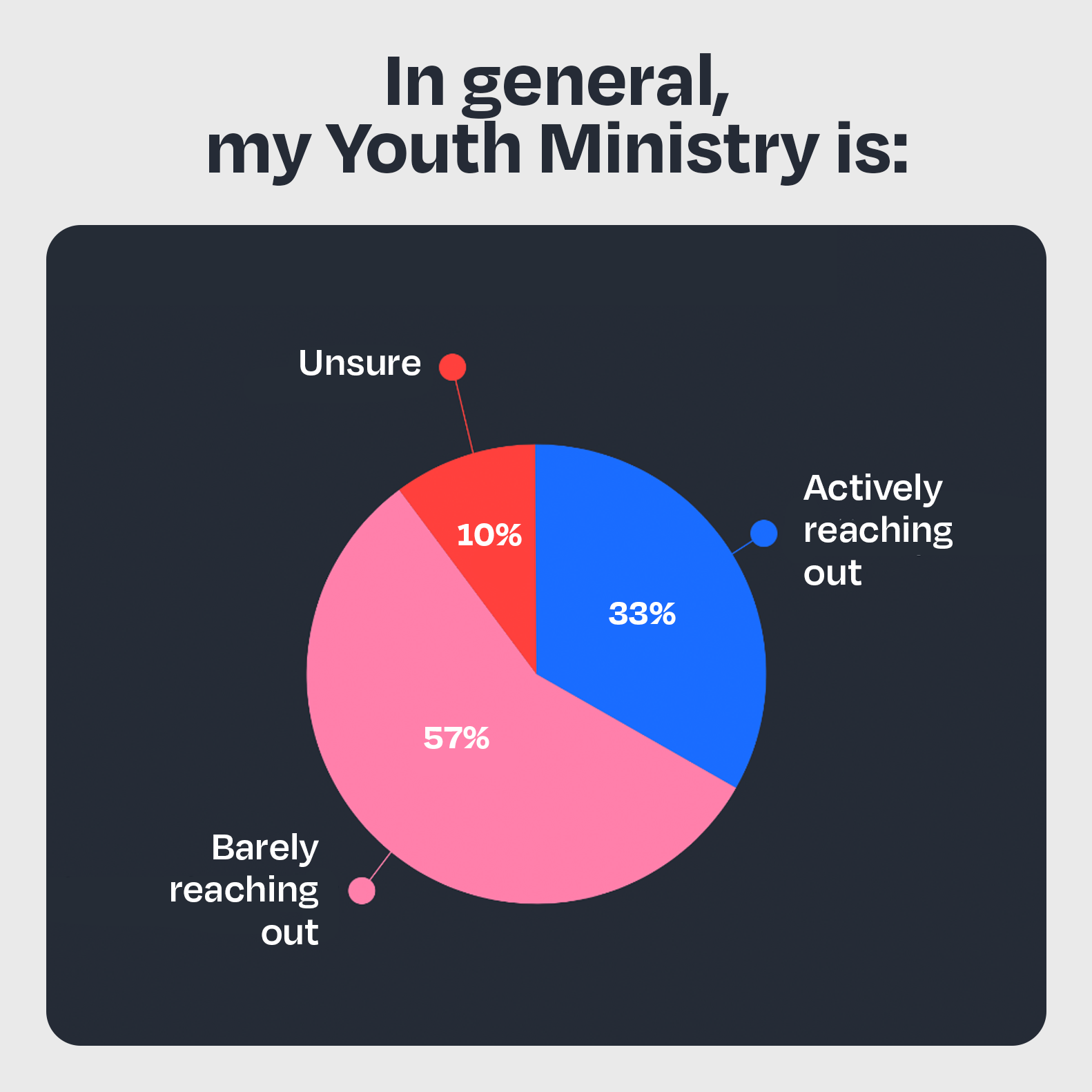
While some 57% said their youth ministry is barely reaching out, Pastor Khong’s encouragement was not to be discouraged about the apparent state of evangelism since it may also be a solvable issue of youths not knowing where to begin when it comes to sharing the gospel.
PASTOR ZHENG KAI: I was actually quite worried about dwindling numbers in our youth ministry.
So we were having a series of harvest events, when I was led to pray in one prayer meeting: “Even if not a single person comes to know God through our efforts, but they end up being planted in other churches — we want to celebrate.”
No one church will be able to win all of Singapore’s youths.
I felt prompted to lead that prayer because I felt that the focus is not just for my youth church to grow, but for Singapore’s youth to come to know Jesus.
Even if some of them come to our events and don’t receive Jesus then, if a seed is planted a seed in them that other churches harvest — we’ll be happy as well. No one church will be able to win all of Singapore’s youths.
Gospel receptivity: Pre-believing youths
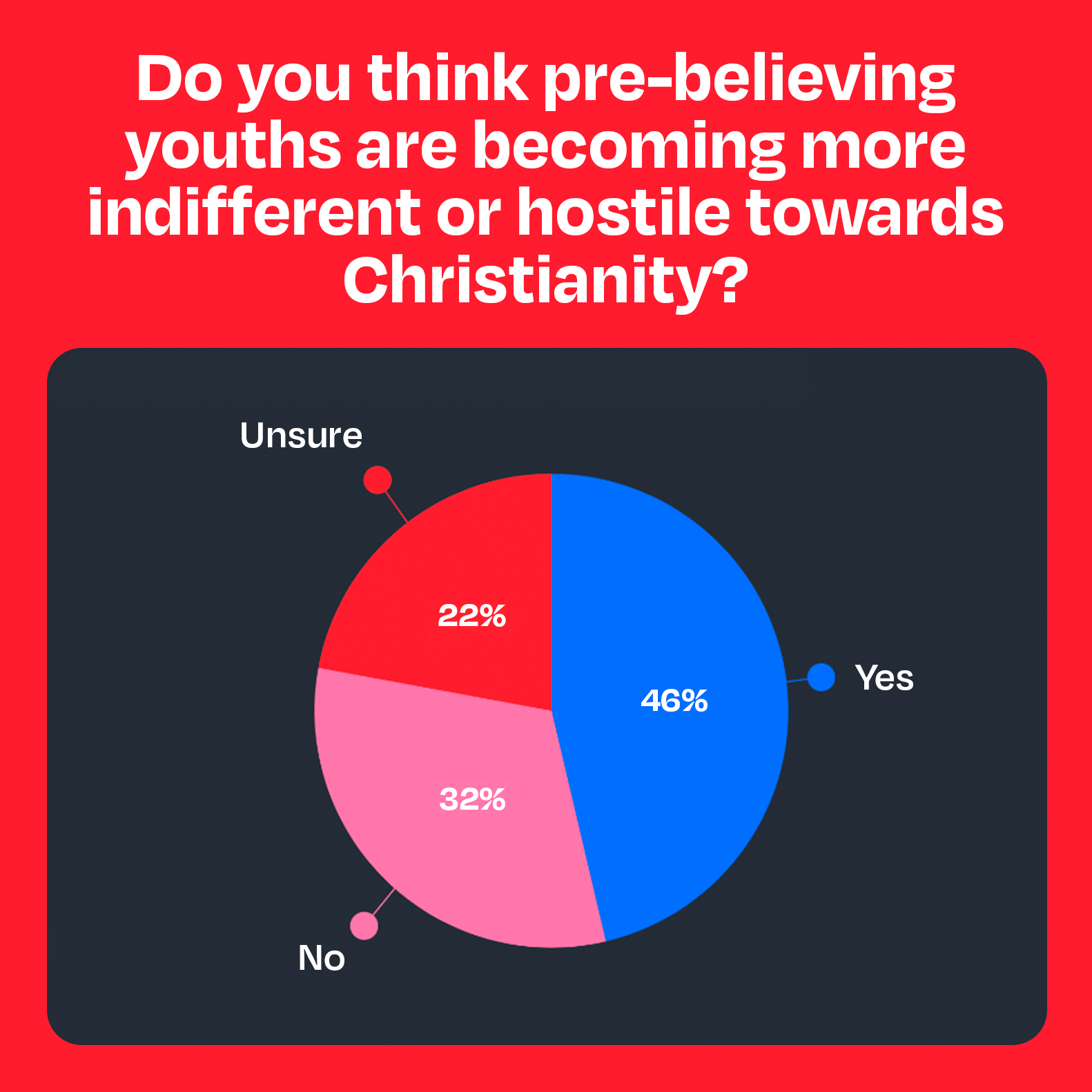
PASTOR JOEL: I don’t think so. I think a section, like the louder, more vocal ones are maybe a little more hostile. But it’s just a slice and I don’t think it’s representative of the generation as a whole.
When you get to sit down with someone, and their first interaction with you is something like “Hey, can I just pray for you? Can I just bless you?” and they experience God meeting a need or a miracle – I think all that just goes away. It’s not an obstacle.
PASTOR ZHENG KAI: We are not at the stage of “hostile” yet. People may be a little bit more indifferent, but it is still possible to reach them and make the gospel relevant to their lives.
Last year, once we had momentum going in our outreach, we saw almost 200 salvations in our youth congregation. This new generation can still be reached!
Gospel receptivity: 2nd/3rd-generation Christian youths
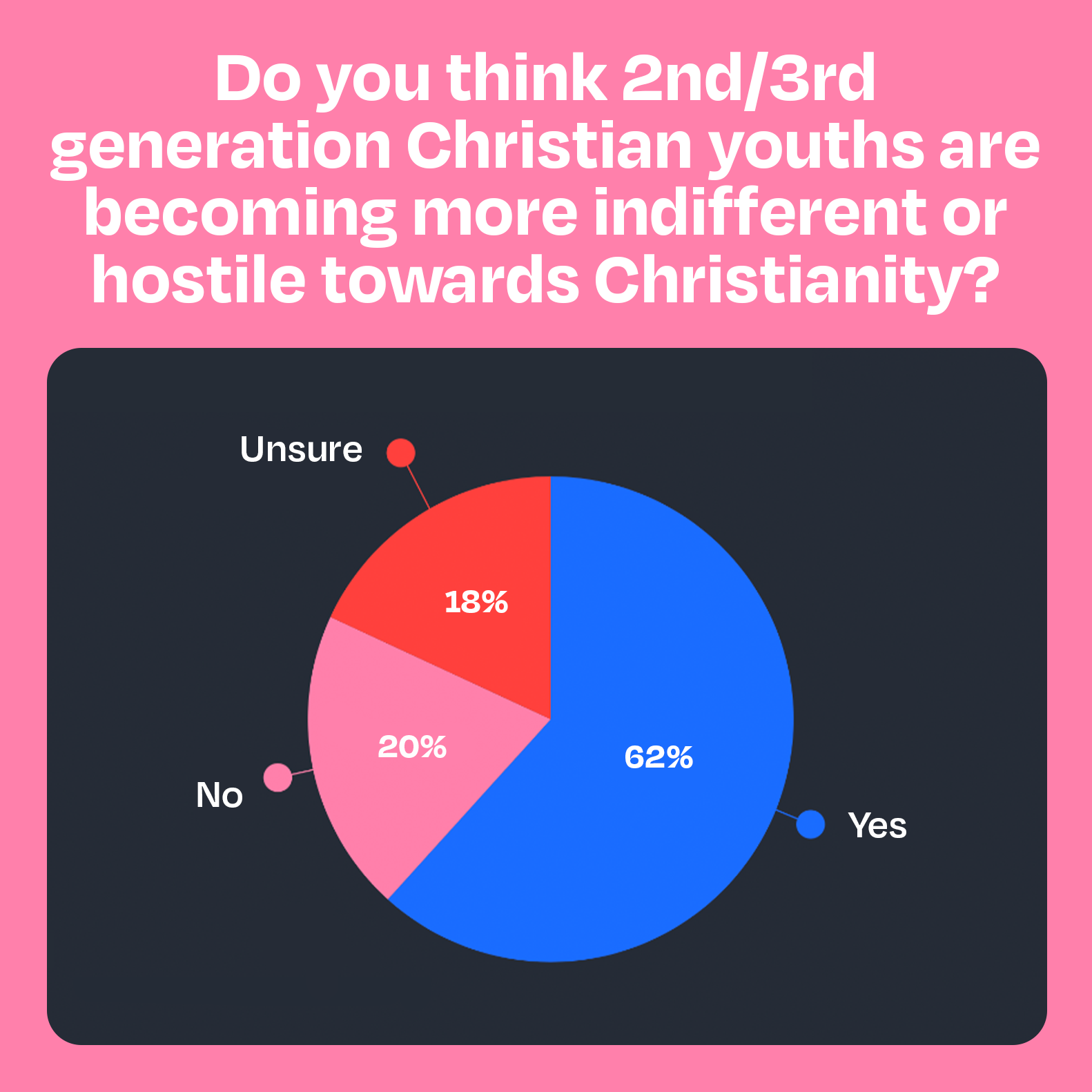
This question got believers thinking a bit more deeply about what goes on in the family. “If the family is not sorted out, the backdoor [of the church] is flung wide open,” remarked Pastor Khong. “Are we really pro-family? Are we really setting an example for what godly Christian families are? Our parents can’t expect their kids to grow up into church leaders when they themselves are not leading.”
… they left because they don’t see the reality of God being lived out in the lives of their parents.
PASTOR MELISSA: The role modelling of parents is really important. Sad to say, sometimes the parents that are harder to deal with in ministry are often the Christian leaders in church.
For the youths who have decided to leave church, a big percentage of them told us that they left because they don’t see the reality of God being lived out in the lives of their parents.
I am a first-generation Christian, but I realised that our second and third-generation Christians still need to be born again.
PASTOR JOEL: How much of a priority is God’s kingdom to parents? Are we prioritising kingdom?
When a parent says “you don’t go cell group, I want you to go tuition instead”, what we’re actually teaching them is that the priority of the kingdom sits lower than the priority of your grades.
I want kids to do well and ace their exams and be an influence in their generation, but the discipleship of young people and children rests primarily on their parents.
As a church and as a ministry, we can do everything we possibly can. But without partnership with parents, it’s not gonna work.
… we’re actually discipling them into a mindset and a lifestyle where kingdom is important when you have time for it – but everything else matters more.
When we say some something to kids like “can you skip this week because you’ve got exams”, we’re actually discipling them into a mindset and a lifestyle where kingdom is important when you have time for it – but everything else matters more.
As a church then, you get two hours per week with a young person – maybe four if they come up to small group. To undo seven days a week of that in four hours is impossible. You can’t do it.
Senior workers on contributing to youth work
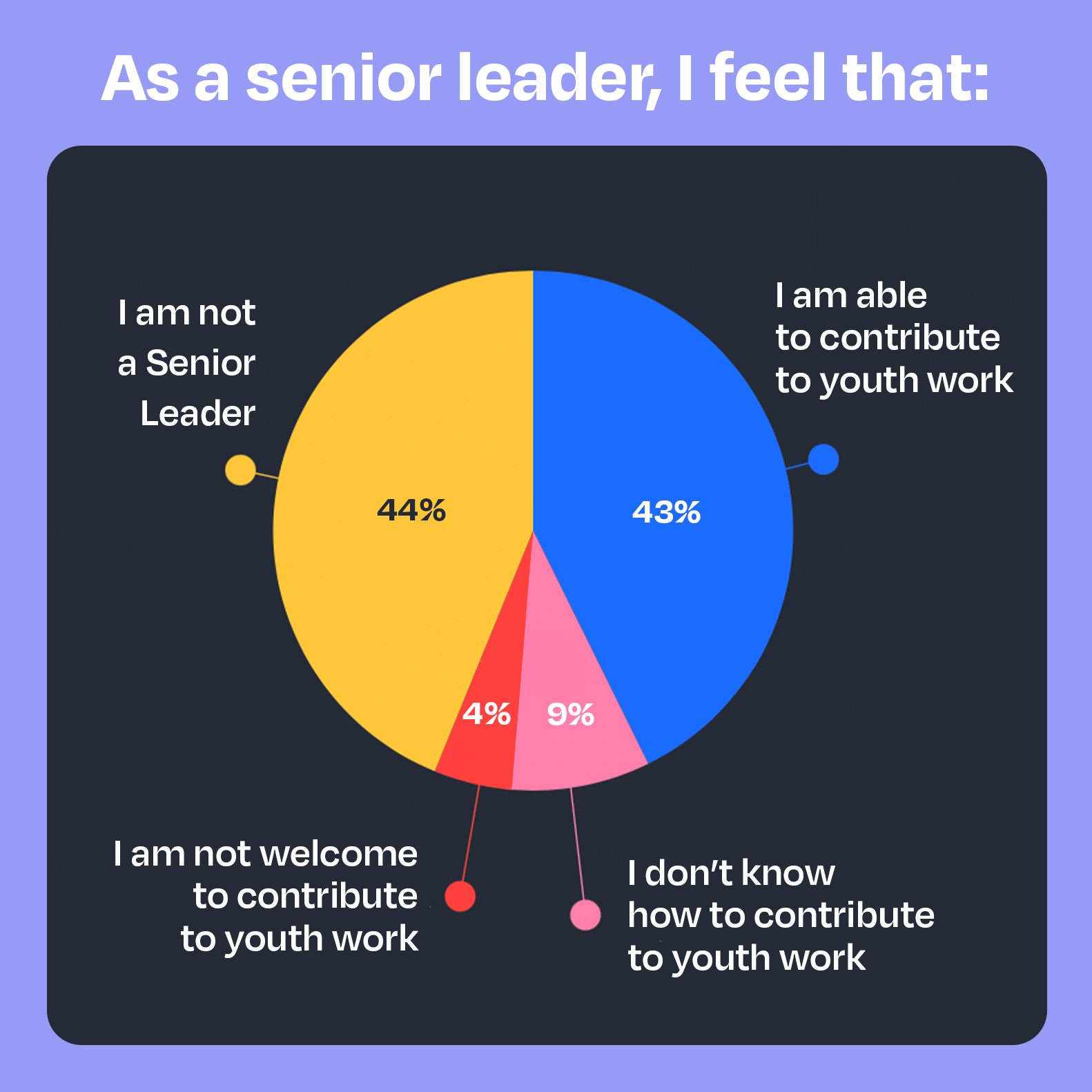
Pastor Khong was heartened to see that most senior leaders feel they can contribute to youth work. “We must be working hand in hand together,” he affirmed.
PASTOR KHONG: We have seen many churches with models whereby the youth church can break off and become its own entity.
We see that quite a lot in the US; how a church gets planted is that they were formerly the youth ministry of another church, the youth ministry becomes so vibrant, while the rest of the church seems to almost decay away.
After an argument or whatever, they just up and leave and then they become their own church – which is a very sad thing.
We talk about a church with no fence and no walls. But for a lot of our churches, inside the church there are fences and walls!
We fence up youth, we fence up children, we fence up adults… and they’re in their own compartments, never to cross paths.
But that is a big mistake. We must come hand in hand.
So as long as there’s one senior leader who feels that they’re not welcome to contribute, that’s not acceptable.
As LoveSingapore, that’s something we want to continue to work together on and and see what we can do to support one another.
PASTOR JOEL: VFC has six locations, but for youth we meet in one location at this point in time. But in terms of services, our priority has always been the Sunday morning service. Main church.
So, if a young person has to pick one service, we actually tell them to go to the Sunday morning service – be in church with everybody else. Because youth ministry is just for a season. Seven, eight years.
Our role as youth pastors and leaders is not to plant people in youth ministry but to plant people in the house. We’re not running with the “youth vision”, we’re reflecting the vision of the house.
We’re not trying to build a youth thing, we’re planting people in the house. Psalm 92 says they will be “planted in the house of the Lord” and that they “will still bear fruit in old age”.
For youth pastors and leaders, our primary responsibility isn’t planting people into “our ministry” or “our culture” – but into the house.
Graft them to the house, so that when they get out of youth ministry, they are still part of the house. It’s not moving from one house to another house, it’s the same house.
- What was one key takeaway from this article?
- What is your role to play in building a united church?
- This week, reach out to your youth pastor and bless him or her in a practical way.









